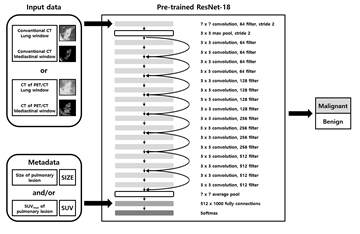글로벌 연구동향
핵의학
- 2021년 10월호
[Clin Nucl Med.] Performance Evaluation of a Deep Learning System for Differential Diagnosis of Lung Cancer With Conventional CT and FDG PET/CT Using Transfer Learning and Metadata.성균관의대 / 박용진, 현승협*
- 출처
- Clin Nucl Med.
- 등재일
- 2021 Aug 1
- 저널이슈번호
- 46(8):635-640. doi: 10.1097/RLU.0000000000003661.
- 내용
Abstract
Purpose: We aimed to evaluate the performance of a deep learning system for differential diagnosis of lung cancer with conventional CT and FDG PET/CT using transfer learning (TL) and metadata.Methods: A total of 359 patients with a lung mass or nodule who underwent noncontrast chest CT and FDG PET/CT prior to treatment were enrolled retrospectively. All pulmonary lesions were classified by pathology (257 malignant, 102 benign). Deep learning classification models based on ResNet-18 were developed using the pretrained weights obtained from ImageNet data set. We propose a deep TL model for differential diagnosis of lung cancer using CT imaging data and metadata with SUVmax and lesion size derived from PET/CT. The area under the receiver operating characteristic curve (AUC) of the deep learning model was measured as a performance metric and verified by 5-fold cross-validation.
Results: The performance metrics of the conventional CT model were generally better than those of the CT of PET/CT model. Introducing metadata with SUVmax and lesion size derived from PET/CT into baseline CT models improved the diagnostic performance of the CT of PET/CT model (AUC = 0.837 vs 0.762) and the conventional CT model (AUC = 0.877 vs 0.817).
Conclusions: Deep TL models with CT imaging data provide good diagnostic performance for lung cancer, and the conventional CT model showed overall better performance than the CT of PET/CT model. Metadata information derived from PET/CT can improve the performance of deep learning systems.

폐 병변의 감별 진단을 위한 전이 학습 모델의 전체적인 개요도
Affiliations
Yong-Jin Park, Dongmin Choi 1 , Joon Young Choi 2 , Seung Hyup Hyun 2
1 Department of Computer Science, Yonsei University, Seoul, South Korea.
2 From the Department of Nuclear Medicine, Samsung Medical Center, Sungkyunkwan University School of Medicine, Seoul.
- 연구소개
- 본 연구에서는 폐암으로 의심되는 병변을 감별진단하기 위해 시행되는 일반적인 chest CT와 FDG PET/CT의 인공지능 진단 모델을 개발하였다. 진단 성능 향상을 위해 전이 학습 기법의 deep learning model을 이용하였다. 전이 학습이란 대량의 일반 이미지 데이터에서 학습된 알고리즘 일부를 의료 이미지를 이용한 인공지능 학습에 차용하여 보다 향상된 deep learning model을 만드는 기법이다. 또한 본 연구에서는 폐 병변의 크기와 maximum SUV 같은 수치화된 metadata를 딥러닝 모델에 추가하여 진단 성능이 향상되는지를 확인하였다. 총 359명의 양성 또는 악성이 병리학적으로 확인된 병변들에 대한 일반적인 chest CT와 PET/CT의 비조영 CT 이미지가 학습에 이용되었다. 이러한 CT 이미지를 학습한 후에 폐 병변을 감별하는 딥러닝 모델을 개발하였고 5-fold 교차 검증을 통해 모델의 성능을 평가하였다. 일반적인 chest CT와 PET/CT의 CT model을 비교하면 chest CT model이 상대적으로 우수한 진단 성능을 보여주었다. 폐 병변의 크기와 maximum SUV 수치 같은 metadata를 딥러닝 모델에 추가하면 PET/CT model에서 진단 성능이 유의하게 향상되는 것을 확인할 수 있었다.
- 덧글달기







